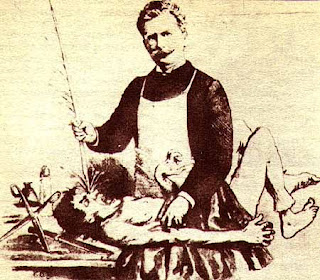
Look at the picture on the left, please. Really look at it. What kind of woman is this? Ignore the hair for a second and focus on her expression. This is Kate Chopin, the woman who rocked polite society with The Awakening and then slammed it again, posthumously, with "The Storm." Does she look like an "unnatural" person? What IS an "unnatural" person, anyway?
.
If you're William Dean Howells, and you should probably be thankful that you're not, since he's been dead for 90 years, you believe that a woman should be too high-minded to think about sex, much less write about it. The Puritan influence has dropped to nothing and the European influence has won. That means, among other things, that sex is bad again, and well-bred people pretend it doesn't exist.
.
The best word we can think of for 19th Century fin de siècle society is "repressive." People had buttoned themselves up and down. "Nice" women put little panties on their pianos, lest the sight of piano legs drive male members of the household into a lust-crazed frenzy. (You think I'm kidding? Go check.) People didn't even say the word "leg." It was a "limb," which might as well be something out of a tree. A lot of time was spent in avoiding "coarseness," which meant anything to do with the body. The epitome of this, and I mean it in the worst, most vicious way, was Virginia Woolfe, who ate sparingly because she could not bear the vulgarity of eliminating waste.
.
In the middle of all this "niceness," all this denial of the body and its animal functions, Kate Chopin wrote a novel, The Awakening. It was published amid a furor, because it is about a woman who leaves her husband and children because they stifle her, takes a lover because she wants to, and is forced to kill herself because she doesn't fit anywhere in her world any more. We can pretty much bet that neither Kate nor her heroine, Edna Pointellier, covered up their piano legs, but they did understand the power of the physical body.
.
And that, said Howells, proved Chopin's "unnaturalness." Women weren't supposed to talk about sex, adultery, and abandoning the family for a life of one's own. (Men could do this, although they were expected to reaffirm the mainstream values in the end.) Howells didn't believe that women were stupid -- he published many stories by women writers -- but he DID believe that they should remain innocent, even after marriage, and preserve those core values of marital fidelity and maternal fecundity.
.
Chopin totally flouted all that, bringing down on her beautifully coiffed head the wrath of men and women alike. Some of this wrath was just ordinary brainless outrage at anything outside the cultural norms, but some of it was the outrage of the intelligent, who saw in her a crack in the dam, threatening to wash away the foundations of American society, or at least move them around some.
.
Even now, as witnessed in our class discussion, we are indignant, even angry, at Calixta in "The Storm." How dare she? What kind of idiot would suggest that a woman could commit adultery and not suffer at all? It begs the question, and I am asking it, what are Kate Chopin and her amoral characters still threatening to do?





